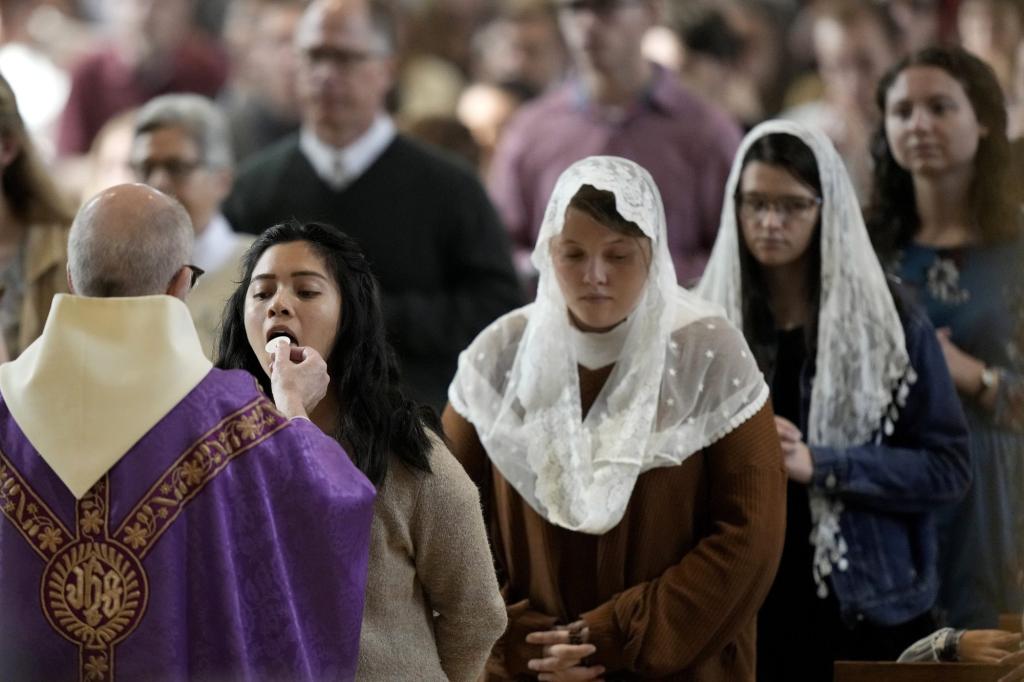Opinion
Published
May 8, 2024, 7:08 p.m. ET
People receiving communion during a Catholic Mass at Benedictine College in Kansas on Dec. 3, 2023.
AP Photo/Charlie Riedel
Last week, a big exposé on the state of American Catholicism did something I never would have expected from the mainstream media:
It made the Church look good.
Not that this was the AP’s intention when it spent nearly 3,000 words attempting to describe a “step back in time” among many younger Catholics, who have embraced traditional ways of praying and the full package of the Church’s doctrinal and moral teaching.
As Mass attendance continues its decades-long decline, these devout Millennials and Zoomers are increasingly making their presence felt in parishes and other Church institutions.
Not everyone is happy about this, and the AP gives a lot of airtime to Catholics disaffected by the changes.
But when it finally looks for flesh-and-blood examples of the new “traditional” vanguard, what does it find?
A Millennial priest who preaches often about God’s mercy and forgiveness — but also of the need to seek that mercy by going to Confession.
Popular podcasters willing to face young people’s toughest questions about sex and relationships without ever seeing the need to water down Church teaching.
A pious college student who prays with her friends, cares about the poor and tries to keep the commandments.
Parents who make the sacrifices necessary to raise big, messy, loving families.
That doesn’t sound like bad company.
Still, the AP can’t resist a bit of pop psychology, implying that something’s off in the way these young Catholics see the world.
They “seem like a tangle of forgiveness and rigidity, where insistence on mercy and kindness mingle with warnings of eternity in hell.”
I’d like to know how the AP would describe Jesus Christ. After all, the same Jesus who showed forgiveness to the worst of sinners also called his followers to live in a radically different way than the rest of the world — and did, indeed, warn of eternal punishment if that invitation is decisively rejected.
The same Jesus who humbled himself, even to the point of dying a criminal’s death, also declared, “I am the way, the truth and the life.”
Is Jesus, too, is just a “tangle” of unresolved emotions? Or is he the Son of God?
Answering that question is surely above the AP’s pay-grade, but it’s clear enough that the young Catholics it profiles are simply trying — haltingly, imperfectly — to be his disciples.
No doubt, believing everything that the Catholic Church teaches requires holding together both ends of a paradox: God’s unconditional love with his unchangeable moral standards.
The article gestures at a lot of incomplete reasons for why a young person in 2024 would find that challenge attractive: There’s the frisson of being countercultural, the beauty and security of being rooted in an ancient tradition.
As a Millennial Catholic myself, I would add a better reason: It’s a lot more realistic than anything else society is offering.
American culture’s instructions to young people are becoming increasingly self-contradictory. One day, it’s uncritical self-affirmation; the next, inescapable guilt.
By that standard, the Church’s message is downright commonsensical.
Yes, I’m a sinner, and God has something to say even about the darkest places in my heart.
If he didn’t care about those places, and if he didn’t expect me to care, he would hardly be as all-powerful or all-knowing as he claims.
But all of this takes place in the context of a much more all-encompassing love.
The whole paradox plays out especially in the central mystery of the Catholic faith, the crucifixion and resurrection of Jesus Christ.
In his death, which bore the weight of all human sin, I see just how serious my sin is.
In his resurrection three days later, God’s love is proved far more powerful.
Embracing the consequences of that love by living as Christ teaches is a daily challenge, which requires reliance on God’s help, Confession when one fails and sometimes great sacrifice.
But the joy and hope of those who have embraced that challenge comes through even on the wires of the AP.
The big problem with mainstream-media takes on Catholicism is that they treat the Church like a sociological curiosity — and try to cram it into categories that just don’t fit.
Thus, the constant expectation that the Church will “change its teaching,” like a political party shedding an unpopular part of its platform, or the AP’s contention that young Catholics are trying to turn back the clock.
But read between the lines, and it’s clear that they’re not focused on 1950 or even 1250, but on eternal truths revealed 2,000 years ago.
These devout young Catholics are simply Catholic, and the Church is blessed to have them.
Fr. John Wilson is a priest of the Archdiocese of New York, where he has ministered in several parishes.
Load more…
{{#isDisplay}}
{{/isDisplay}}{{#isAniviewVideo}}
{{/isAniviewVideo}}{{#isSRVideo}}
{{/isSRVideo}}
https://nypost.com/2024/05/08/opinion/the-ap-just-showed-it-knows-absolutely-nothing-about-young-catholics/?utm_source=url_sitebuttons&utm_medium=site%20buttons&utm_campaign=site%20buttons
Copy the URL to share
